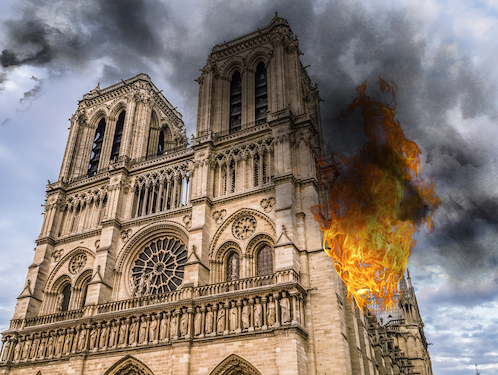The flames that consumed the spire of Notre Dame and burned the 856-year-old church to its foundations could have been doused by the tears of the faithful. If France heeds calls to rebuild the cathedral as a reflection of what modern “French people want,” the new structure may be flooded by their tears.
The fire, whose origins remain under investigation, was initially reported to have left little more than medieval stones, rose windows, and – make of this what you will – its golden altar cross untouched.
Donations nearing $1 billion have already poured in from around the world, without government compulsion. French President Emmanuel Macron pledged to rebuild the church within five years, a timeline as ambitious (and potentially, as unrealistic) as his plans for the eurozone.
“We will rebuild the cathedral to be even more beautiful,” Macron said.
But what shape will the cathedral’s renovation take? Who will decide which alterations “improve” on the original?
The answer came earlier today, when Prime Minister Édouard Philippe announced an international competition for architects to submit proposals for “a new spire that is adapted to the techniques and the challenges of our era.”
As the litany says, “Good Lord, deliver us.”
Increasingly, secularists are demanding a voice in the reconstruction of a Roman Catholic cathedral and sanctuary. While some want the cathedral restored to its original condition, others say the government should reimagine Notre Dame as a multi-faith monument or a tribute to European secularism. Rolling Stone reports that John Harwood, an architectural historian and associate professor at the University of Toronto:
believes that it would be a mistake to try to recreate the edifice as it once stood … Any rebuilding should be a reflection not of an old France, or the France that never was — a non-secular, white European France — but a reflection of the France of today, a France that is currently in the making. “The idea that you can recreate the building is naive. It is to repeat past errors, category errors of thought, and one has to imagine that if anything is done to the building it has to be an expression of what we want — the Catholics of France, the French people — want. What is an expression of who we are now? What does it represent, who is it for?,” he says.
Harwood justified redesigning Notre Dame as a reflection of modern zeitgeist, because “[i]t’s literally a political monument. All cathedrals are.”
Au contraire, Monsieur Harwood.
Christians built cathedrals as earthly embassies of the kingdom of Heaven. These architectural wonders were created as expressions of faith. Their beauty and wonder provide a foretaste of the splendor and order of eternity.
Like everyone else, I was glued to the unfolding drama. As the fire devoured the building, I wondered what Paris would look like if the city’s forefathers had been as secular as their descendants – if the original building had been “an expression of who we are now,” rather than who we were then.
The answer I came up with is simple: The spot would be vacant. Or it would be used as yet another ugly government building or overregulated business. They would pave paradise and put up a parking lot.
Atheism erects no cathedrals. It has no Psalms or hymns. Secularism has sterilized the imagination of the West. Even etymologically, the term atheism is fundamentally destructive.
A French political class clinging to laïcité – the secular “we” Harwood wants to unleash like locusts on the decimated ruins – cannot rebuild the cathedral, because modern Europe lacks any cohesive morality. “European values” amount to little more than a hollowed-out shell of Christendom devoid of everything except “tolerance” and “pluralism.” Atheism and polytheism have led to an embrace of polylogism.
Atheism, like the fires of Notre Dame (or the fires that surely burn more brightly elsewhere), destroys all it touches.
The greatest treasures of architecture, artwork, poetry, and literature created by the West were inspired by the Christian faith. The Scriptures deeply penetrated the European mind and burst out into a million triumphs of artistry. Their reason and rhythm shape the mind of everyone born into the culture to this day (albeit less than one may hope).
The burning of Notre Dame broke the heart of the West, because its symbolism goes deeper than politics, pop culture, or other bits of intellectual flotsam and jetsam. It stood as a monument of the permanent things that created Western Civilization, the things that still define each of us in the dormant, and the best, parts of our hearts. The belfries of all Christendom echo its message of hope, redemption, and peace. Only those ablaze with the fiery flame of divine love can rebuild Notre Dame, or Europe, from the debris.
Government lacks the inspiration and unifying vision necessary to build a cathedral. Politicians should assure that that the State does not assert itself into the Church’s reconstruction plans. For more than eight centuries, Notre Dame as it stood – to reflect a Europe of faith – so perfectly represented the West’s greatest aspirations that its loss still tears a hole in the even the most secular heart.
(Photo credit: Stefano Zaccaria / Shutterstock.com.)
